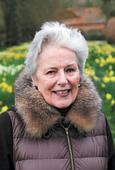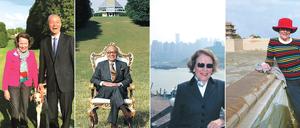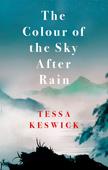Former British policy adviser Tessa Keswick addresses misunderstandings about China in a book, Andrew Moody reports.
 Tessa Keswick poses in her garden in Wiltshire in South West England. (PHOTO PROVIDED TO CHINA DAILY)
Tessa Keswick poses in her garden in Wiltshire in South West England. (PHOTO PROVIDED TO CHINA DAILY)
Tessa Keswick insists many in the West, even many in influential positions, do not know China at all.
The retired British top policy adviser, therefore, has made it her mission to address some of these, often cultural, misunderstandings in her highly engaging new book, The Colour of the Sky After Rain, about her own nearly 40-year love affair with the country.
"People really do not know much about China. Even the people who should do, don't," she says.
I got to know Chinese people over these many, many years. I just was so impressed by some of their characteristic qualities. They are very remarkable
Tessa Keswick, former British top policy adviser
"They apply all sorts of criteria, often Western criteria, while rather neglecting to see themselves in the mirror at the same time."
Keswick, 77, is nothing if not well connected. The daughter of a Scottish earl, she has held a number of high profile positions, including being a former special policy adviser to former UK cabinet minister Kenneth Clarke, director of the Centre for Policy Studies, an influential London-based think tank, as well as chancellor of the University of Buckingham in the United Kingdom.
She is also the wife of Sir Henry Keswick, chairman emeritus of Jardine Matheson, the Hong Kongbased trading conglomerate.
This brings a unique perspective to her book, which, although a memoir, is at the same time a firsthand account of China's extraordinary journey since reform and opening-up. The idea for the book, in fact, was first planted by former UK deputy prime minister Michael Heseltine.
"Without sort of dropping names, he said to me five or six years ago that I was so lucky to have seen this incredible rise of China, which he said is probably one of the most important things in our lifetime, and why didn't I write about it," she says.
Keswick's journey on the Chinese mainland began at Shanghai's old Hongqiao airport in 1982 when she accompanied her then-boss David Tang, the late flamboyant Hong Kong entrepreneur who was then 28, and a group of British businesspeople looking to invest in China as it was opening its doors.
"My job was to find British firms who wanted to invest in China and take them to places. We did get a couple of things going. Tate & Lyle (the UK sugar company) set up a tea plantation and someone else set up a small factory," she says.
 (From left) Tessa Keswick with Beijing’s Party Secretary Cai Qi. Architect I.M. Pei poses in front of the pavilion he designed in Keswick’s garden. Keswick’s Chinese exploration covers Chongqing (third from left) and Jiayuguan in Gansu province. (PHOTO PROVIDED TO CHINA DAILY)
(From left) Tessa Keswick with Beijing’s Party Secretary Cai Qi. Architect I.M. Pei poses in front of the pavilion he designed in Keswick’s garden. Keswick’s Chinese exploration covers Chongqing (third from left) and Jiayuguan in Gansu province. (PHOTO PROVIDED TO CHINA DAILY)
They went on to Ningbo, Zhejiang province, where the poverty was "palpable" and she had to survive in hotels with beds with thin mattresses and meals of "shrimps in an unidentifiable gluey substance" that were barely edible despite foreigners being given the best that was available.
"I was brought up in the north of Scotland in the 1950s, so the hardship didn't terribly bother me," she says, laughing.
Amid the grayness of China then the first thing of beauty she encountered was the color of the sky "dissolving into delicate shades of pink, blue and white" after it had been drizzling, hence the title of her book. She discovered later this was a sought-after color effect in Song Dynasty (960-1279) ceramics.
"The sky was suddenly illuminated and it was the first beautiful thing I'd seen since I'd been there. I thought my goodness, what an extraordinary thing this is, this wonderful light that had it just literally filtered through," she says.
Her first visit to Beijing was in 1985 when she went on honeymoon with Henry Keswick, her second husband.
The UK had just signed the joint declaration with China about the future of Hong Kong and Jardine Matheson was trying to get back to the mainland, which it had largely left, apart from Guangdong province, when the People's Republic was formed in 1949.
They had dinner with the "rather portly" British ambassador Richard Evans at Maxim's, then one of the city's most expensive Western restaurants, who warned them that Jardines would never be forgiven for its role in the Opium Wars.
"We were very despondent and, of course, it was a particularly gloomy evening, especially after the doorknob came off our hotel room door later. Henry thought it was typical Foreign Office speak. It was they who thought Jardines was rather suspect and not the Chinese," she says.
Twelve years later, in 1997, Henry Keswick was summoned to Beijing by then vice-premier Zhu Rongji (a year before he became premier) and invited back, a meeting that paved the way to 300 business licenses for the company.
"He (Zhu) said, 'Why on Earth aren't you investing here?' I think once Hong Kong was no longer a colony, but part of China, they rather welcomed foreigners more," she says.
She mentions in the book that her husband, now 81, prefers the company of Chinese people to British or Western.
"Well, I would say that he is very much at home with them. I said 'prefer' in the book but he likes English people, too," she adds, laughing. "I think basically I mean (he) respects (them) more for the very remarkable qualities they have."
 Her memoir is not only about her own nearly 40-year love affair with China but also her firsthand account of the country's development over the past few decades. (PHOTO PROVIDED TO CHINA DAILY)
Her memoir is not only about her own nearly 40-year love affair with China but also her firsthand account of the country's development over the past few decades. (PHOTO PROVIDED TO CHINA DAILY)
Tessa Keswick began studying Chinese at the School of Oriental and African Studies in London and then by staying with a family in Beijing. The family had been quite poor factory workers but were now living a relatively comfortable existence.
"I stayed with them many times. It is a wonderful language to learn. I think it's essential actually to take the trouble to learn something of the language, but I couldn't say I had any proficiency at all," she says.
Tessa Keswick has brought reminders of China back to her homes. On her honeymoon trip she brought back acorns from the Ming Tombs near the Great Wall for the garden in her country home in Wiltshire in South West England.
"The tree now is growing in the garden, but actually the climate is not right for it, because you need very, very cold winters and very hot summers for it to be happy. So it's not as happy as it should be. It was actually planted by (former UK prime minister) Mrs Thatcher three months before she left office," Tessa Keswick adds.
The pavilion in her garden was also actually designed by the Chinese American architect I.M. Pei, who died last year at the age of 102. It is his only work in the UK.
"I just got carried away by this museum he had designed in Kyoto. He'd retired so he was prepared to do this small pavilion for us, and we became great friends. He was a most wonderful man," she says.
Tessa Keswick is one who believes the UK should closely engage with the world's second-largest economy. She fully endorses the concept of the "golden era" of relations, fostered by President Xi Jinping's visit to the UK in October 2015. Her husband, whose company owns the London Mandarin Oriental Hotel, greeted Xi at the front door when he spent the first night of his visit there.
"It was wonderful. It was exactly what we (the UK) should be doing. I believe in constructive engagement," she says.
She is very much against the lecturing tone that some UK and Western politicians adopt toward China.
"Criticizing people you are trying to make friends with is about the worst thing that you could possibly do. It is not the way to get to know people. I think (UK Prime Minister) Boris (Johnson), who is an educated man and has a broad vision, understands that the relationship with China is very important," she says.
Tessa Keswick says she hopes through her book she can get across to a wider audience the China that she herself has come to know.
"I got to know Chinese people over these many, many years. I just was so impressed by some of their characteristic qualities. They are very remarkable," she says.
"I also wanted to get across this very deep culture as well as the country itself, the geography of it, its beauty and variety as well as the extraordinary events that have taken place almost everywhere you visit."
Contact the writer at andrewmoody@chinadaily.com.cn


